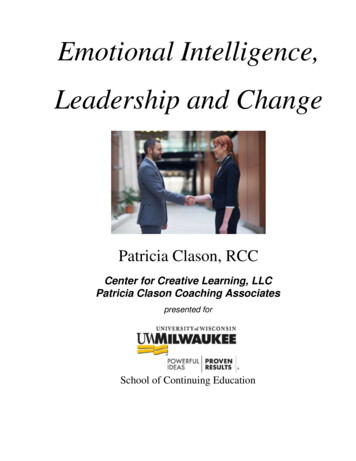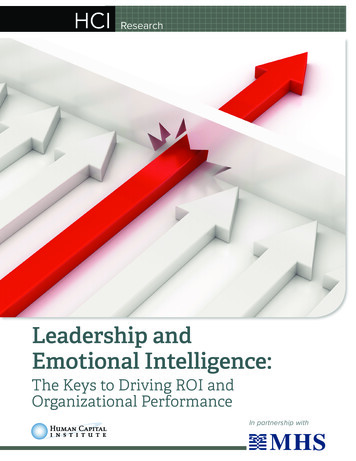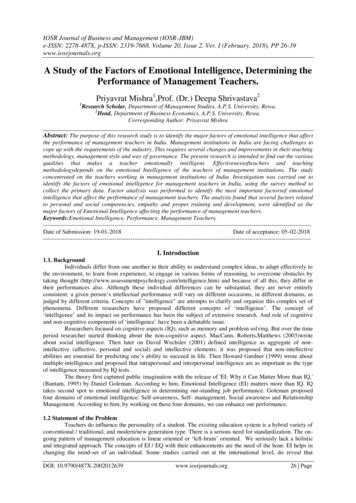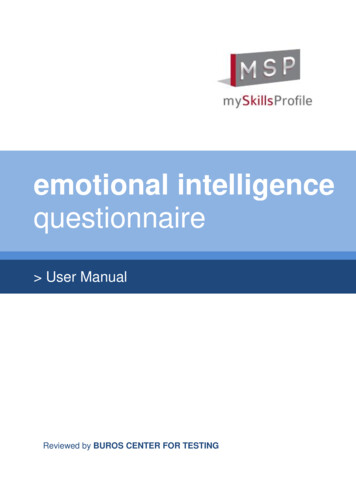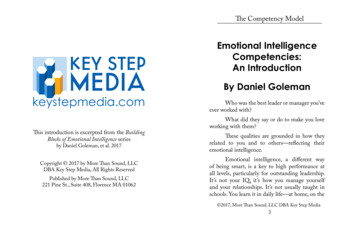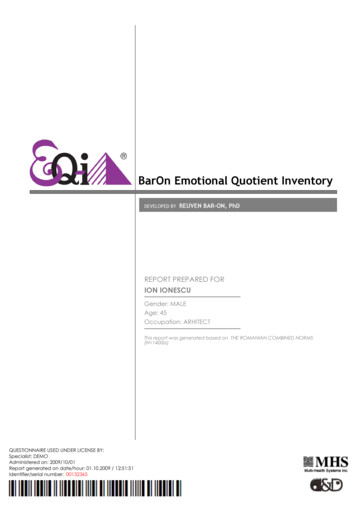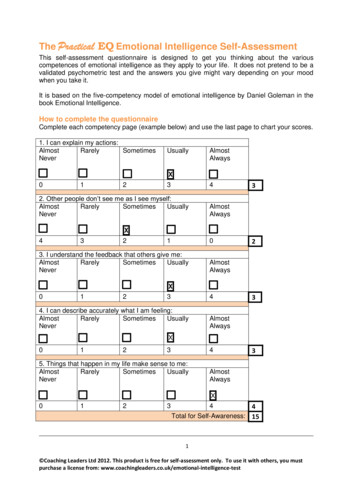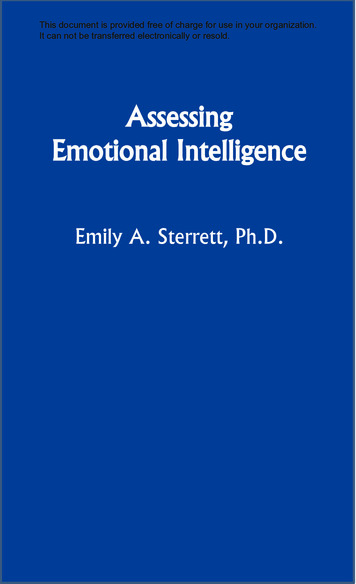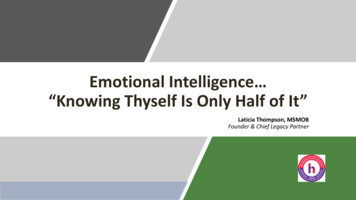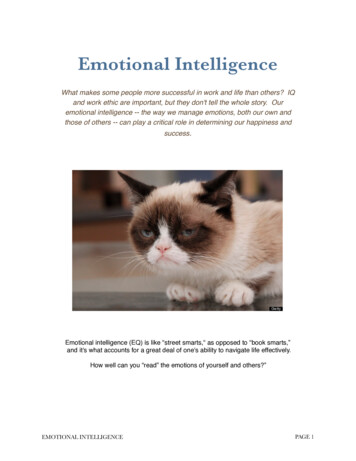
Transcription
Emotional IntelligenceWhat makes some people more successful in work and life than others? IQand work ethic are important, but they don't tell the whole story. Ouremotional intelligence -- the way we manage emotions, both our own andthose of others -- can play a critical role in determining our happiness andsuccess.Emotional intelligence (EQ) is like "street smarts," as opposed to "book smarts,”and it's what accounts for a great deal of one's ability to navigate life effectively.How well can you “read” the emotions of yourself and others?”EMOTIONAL INTELLIGENCEPAGE !1
Thinking and Feeling: Both Critical to Life Happiness and SuccessEveryone knows that high IQ is no guarantee of success, happiness, or virtue, but untilEmotional Intelligence, we could only guess why. Daniel Goleman's brilliant report from thefrontiers of psychology and neuroscience offers startling new insight into our "two minds"—therational and the emotional—and how they together shape our destiny."What having emotional intelligence looks like is that you're confident, good at workingtowards your goals, adaptable and flexible. You recover quickly from stress and you'reresilient," Daniel Goleman, psychologist and author of Focus: The Hidden Driver of Excellence,tells The Huffington Post. "Life goes much more smoothly if you have good emotionalintelligence.” (The Huffington Post By Carolyn Gregoire)EMOTIONAL INTELLIGENCEPAGE !2
The Five Components of Emotional Intelligence- Dr. Goleman1. You're curious about people you don't know.Do you love meeting new people, and naturallytend to ask lots of questions after you've beenintroduced to someone? If so, you have a certaindegree of empathy, one of the main components ofemotional intelligence.!2. You're a great leader.Leaders who know and can manage their ownemotions, and who display self-control and delayof gratification, serve as role models for theirfollowers, thereby enhancing followers’ trust andrespect.Emotional intelligence studies support the thehigher an EI is, the person will have theleadership behaviors of: influence,inspirational motivation and individualconsideration.3. You know your strengths and weaknesses.An emotionally intelligent person learns to identifytheir areas of strength and weakness, and analyzehow to work most effectively within this framework.This awareness breeds the strong self-confidencethat's a main factor of emotional intelligence,according to Goleman.EMOTIONAL INTELLIGENCEHighly Empathetic People (HEPs) -- those whoare extremely attuned to the needs andfeelings of others, and act in a way that issensitive to those needs --PAGE !3
4. You have a greater ability to concentrate.The ability to withstand distractions and focus onthe task at hand is a great secret to emotionalintelligence, Goleman says. Without being presentwith ourselves and others, it's difficult to developself-awareness and strong relationships.--Your ability to do your schoolwork, and to putoff looking at that text or playing that videogame until after you're done . in childhood isa greater predictor of your financial success inadulthood than either your IQ or the wealth ofthe family you grew up in.5. When you're upset, you know exactly whyAn important aspect of self-awareness is the abilityto recognize where your emotions are coming fromand to know why you feel upset.!6. You can get along with most people."Having fulfilling, effective relationships -- that's asign [of emotional intelligence]," says Goleman.Humor, laughter, and play are natural antidotesto life’s difficulties; they lighten your burdensand help you keep things in perspective. Agood hearty laugh reduces stress, elevatesmood, and brings your nervous system backinto balance.Playful communication broadens your emotionalintelligence and helps you:*Take hardships in stride.*Smooth over differences.*Say things that might be otherwise difficult toexpress without creating a flap.*Simultaneously relax and energize yourself.*Relieves fatigue and relaxes your body, whichallows you to recharge and accomplish more.*Become more creative.7: Resolve conflict positivelyOnce you know how to manage stress, stayemotionally present and aware, communicatenonverbally, and use humor and play, you’ll bebetter equipped to handle emotionally chargedsituations and catch and defuse many issuesbefore they escalate.EMOTIONAL INTELLIGENCETips for resolving conflict in a trust-buildingway:* Stay focused in the present. When you are notholding on to old hurts and resentments, you canrecognize the reality of a current situation and view it asa new opportunity for resolving old conflicts.* Choose your arguments. Arguments take time andenergy, especially if you want to resolve them in apositive way. Consider what is worth arguing about andwhat is not.* Forgive. Other people’s hurtful behavior is in the past.To resolve conflict, you need to give up the urge topunish or seek revenge.* End conflicts that can't be resolved. It takes twopeople to keep an argument going. You can choose todisengage from a conflict, even if you still disagree.PAGE !4
8. You care deeply about being a good, moralperson.One aspect of emotional intelligence is our "moralidentity," which has to do with the extent to whichwe want to see ourselves as ethical, caringpeople. If you're someone who cares aboutbuilding up this side of yourself (regardless of howyou've acted in past moral situations), you mighthave a high EQ.EMOTIONAL INTELLIGENCEEmotional intelligence consists of fourattributes:Self-awareness – You recognize your own emotionsand how they affect your thoughts and behavior, knowyour strengths and weaknesses, and have selfconfidence.Self-management – You’re able to control impulsivefeelings and behaviors, manage your emotions inhealthy ways, take initiative, follow through oncommitments, and adapt to changing circumstances.Social awareness – You can understand theemotions, needs, and concerns of other people, pick upon emotional cues, feel comfortable socially, andrecognize the power dynamics in a group ororganization.Relationship management – You know how todevelop and maintain good relationships, communicateclearly, inspire and influence others, work well in a team,and manage conflict.PAGE !5
Emotional Intelligence, we could only guess why. Daniel Goleman's brilliant report from the frontiers of psychology and neuroscience offers startling new insight into our "two minds"—the rational and the emotional—and how they together shape our destiny. "What having emotional intelligence
